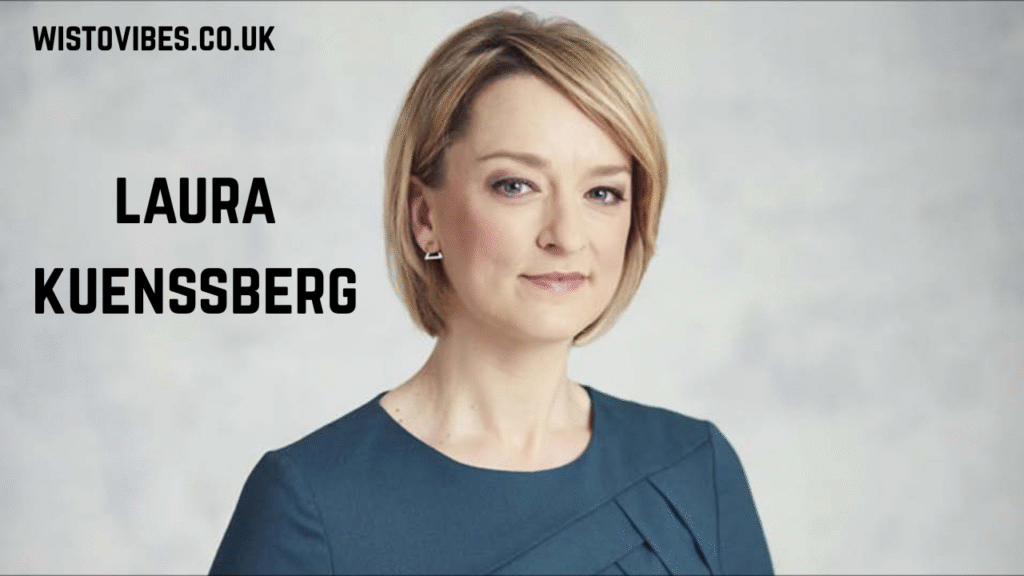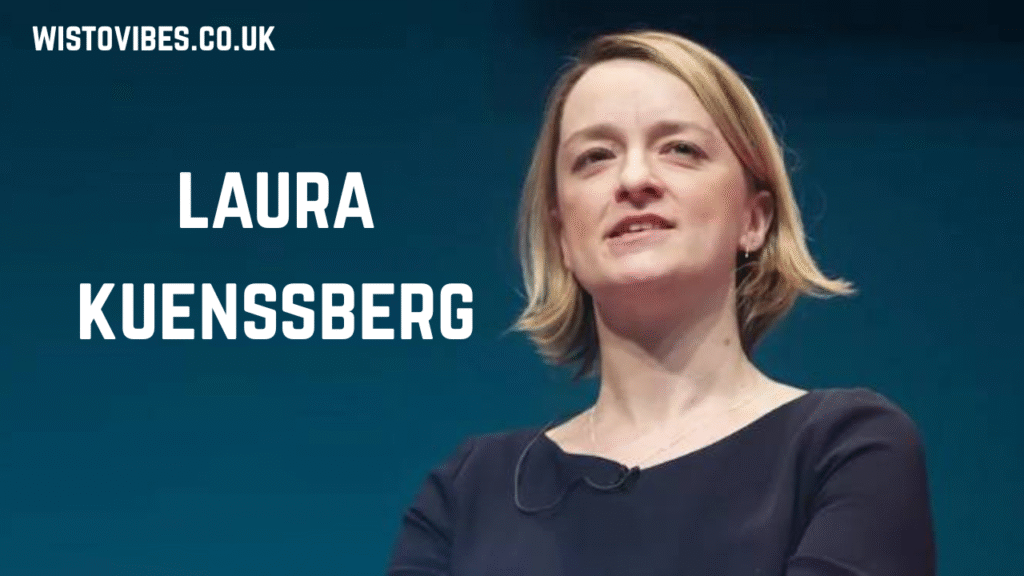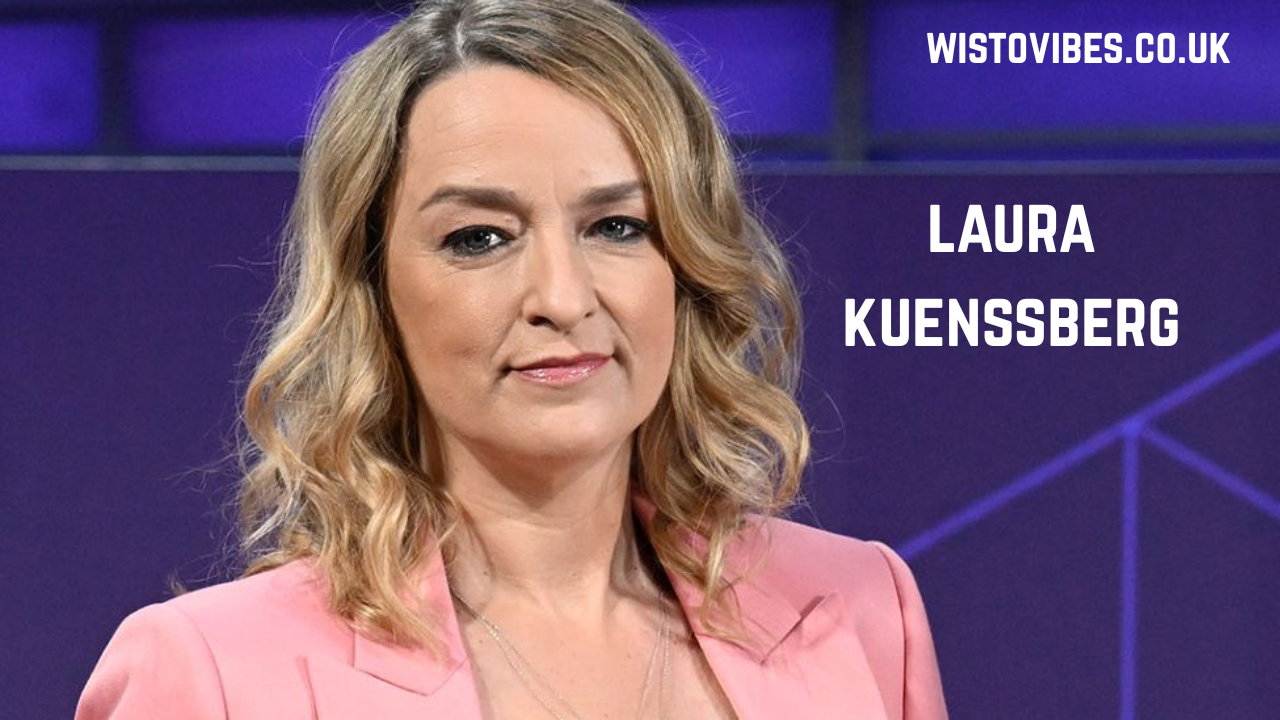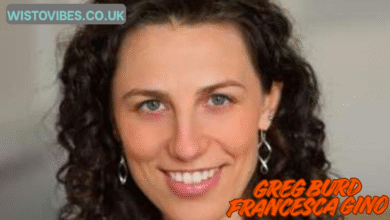Laura Kuenssberg was born in Italy in 1976 to a well-established family with strong professional backgrounds. She grew up in Glasgow, Scotland, where she developed an early awareness of public affairs, politics, and social issues. Her father worked in business, while her mother was involved in social services, providing her with an environment where intellectual debate and curiosity were encouraged. Laura’s Scottish-Italian heritage also gave her a broad perspective on cultural identity and international issues. She went on to study history at the University of Edinburgh, where she was deeply engaged with current affairs, before moving to the United States to study journalism at Georgetown University in Washington, D.C. This blend of education shaped her sharp analytical skills and gave her the ability to report political matters with global insight.
The Beginning of Laura Kuenssberg’s Journalism Career

Laura Kuenssberg began her professional career in journalism with local broadcasting before joining the BBC in 2000 as a trainee journalist. Her early career involved reporting for regional news programs in the northeast of England, where she gained hands-on experience covering everything from council meetings to regional elections. These formative years gave her a deep understanding of the mechanics of politics at the local level. Her professionalism, quick thinking, and ability to connect complex political decisions to everyday life distinguished her from many of her peers and quickly positioned her for higher responsibilities in the broadcasting world.
Rise to Prominence at the BBC
Laura Kuenssberg’s reputation for incisive reporting grew as she moved to more significant roles within the BBC. In 2009, she was appointed as chief political correspondent, a position that thrust her into the heart of Westminster politics. Her ability to deliver clear and direct analysis during some of the most turbulent political years, including the financial crisis aftermath and coalition government negotiations, gained her recognition from viewers and political insiders alike. She developed a reputation for asking difficult but fair questions, often holding senior political figures to account in high-pressure interviews.
Laura Kuenssberg as the BBC’s First Female Political Editor

In 2015, Laura Kuenssberg made history by becoming the BBC’s first female political editor, a groundbreaking achievement in an industry long dominated by men. This appointment was widely celebrated as a sign of progress for women in media, but it also came with immense scrutiny and responsibility. As political editor, she was tasked with explaining government decisions, parliamentary debates, and party strategies to millions of viewers across the UK. She became a central figure in how the public consumed political news, often appearing on flagship programs like BBC News at Ten and special election broadcasts.
Coverage of the Brexit Referendum
One of the defining periods of Laura Kuenssberg’s career was her coverage of the Brexit referendum in 2016. The vote to leave the European Union was one of the most significant political events in modern British history, and Kuenssberg was at the forefront of reporting it. Her live updates, interviews, and analysis gave the public essential insights into the rapidly shifting political landscape. She was praised for her ability to present complex EU negotiations and parliamentary debates in a way that ordinary viewers could understand. However, her high-profile role also made her a target for criticism from both Leave and Remain supporters, demonstrating the polarized environment in which political journalists now operate.
Laura Kuenssberg and General Elections

Throughout her career, Laura Kuenssberg has played a pivotal role in covering several UK general elections. From the 2017 election that resulted in a hung parliament to the decisive Conservative victory in 2019, she provided sharp commentary that shaped public understanding of political strategies and outcomes. Her on-air presence during election nights became an expected feature, and she often broke major stories about party maneuvers, leadership challenges, and coalition talks. Her election coverage has been both praised for its accuracy and criticized for perceived bias, reflecting the difficult balance journalists face when reporting on divisive political contests.
Influence on Political Discourse
Laura Kuenssberg’s influence extends beyond reporting events; she plays a significant role in shaping political discourse in Britain. Politicians often react to her interviews, knowing that her questions may set the agenda for public debate. Her reporting can frame how a story is perceived, which has occasionally led to claims of bias from across the political spectrum. However, supporters argue that this influence simply reflects her central role in holding power to account. Her work demonstrates the vital function of journalism in a democracy: ensuring transparency, scrutiny, and accountability.
Criticisms and Controversies
With great influence comes inevitable controversy, and Laura Kuenssberg has faced her share of criticism. Some viewers and political groups have accused her of favoring one side over another, particularly during Brexit debates and election coverage. Others have suggested that her reporting sometimes leans too heavily on insider sources within government. Despite these criticisms, the BBC has consistently defended her impartiality, emphasizing her professionalism and adherence to journalistic standards. Kuenssberg herself has acknowledged the challenges of her role, noting that impartial reporting often displeases people on both sides of an issue.
The Role of Social Media in Her Career
Laura Kuenssberg has also embraced social media as part of her journalism. Her Twitter account became one of the most-followed sources for real-time political updates during major events, from leadership contests to parliamentary votes. However, this visibility has also exposed her to online abuse and harassment, a common problem faced by many high-profile female journalists. Despite the challenges, she continues to use digital platforms to provide breaking news and engage with audiences, recognizing the importance of adapting journalism to a changing media environment.
Laura Kuenssberg’s Interviewing Style
One of Laura Kuenssberg’s trademarks is her interviewing style. She is known for being direct, persistent, and unafraid to challenge politicians when they avoid answering questions. This approach has made her interviews must-watch television, as viewers often witness politicians being pressed into revealing more than they initially intended. While some critics see her style as overly combative, many appreciate her commitment to ensuring that those in power are not given an easy pass. Her interviews with figures like Boris Johnson, Theresa May, and Jeremy Corbyn have been widely discussed and analyzed.
Transition to New Roles
After seven years as BBC political editor, Laura Kuenssberg stepped down from the role in 2022, moving into a new position as the host of the flagship Sunday morning politics program on BBC One. This transition allowed her to take on a different format of political journalism, one that combines interviews, analysis, and long-form discussions. It marked the next chapter in her career, demonstrating her versatility and ability to adapt to changing media demands. She continues to remain one of the most influential voices in British journalism.
Laura Kuenssberg and Gender Representation in Journalism
Laura Kuenssberg’s career has also highlighted the challenges and opportunities for women in journalism. As the first female political editor at the BBC, she became a role model for aspiring journalists, showing that women can succeed at the highest levels of political reporting. Her experiences also brought attention to the gender-based abuse and criticism that female journalists often face online and in public life. By remaining visible and vocal in her role, Kuenssberg has helped to push for greater gender equality in the media industry.
Contributions to Public Understanding of Politics
One of Laura Kuenssberg’s greatest contributions is her ability to translate complex political developments into accessible explanations for the general public. Politics can often appear remote or confusing, filled with jargon and procedural detail. Kuenssberg’s reporting bridges that gap, making politics more understandable and engaging for viewers. This skill is especially important in times of political crisis, when clarity and context are most needed. Her work has helped millions of people better understand the decisions being made in Westminster and their impact on daily life.
Recognition and Awards
Over the course of her career, Laura Kuenssberg has received numerous awards and accolades for her journalism. She has been recognized for her accuracy, dedication, and ability to break major political stories. These awards reflect the respect she commands within the industry, even amid controversy. Her recognition also highlights the value of high-quality political journalism at a time when misinformation and distrust of the media are widespread. Kuenssberg’s achievements serve as a reminder of the importance of rigorous, professional reporting.
The Pressure of Being a Public Figure
Laura Kuenssberg’s high-profile role has meant living under constant public scrutiny. Every word she speaks and every report she delivers is analyzed and sometimes criticized by audiences, politicians, and commentators. This pressure requires resilience and a strong sense of professional duty. Kuenssberg has spoken about the challenges of this visibility but remains committed to her work, knowing that journalism is about serving the public rather than pleasing everyone. Her perseverance under such scrutiny demonstrates her dedication to her craft.
Laura Kuenssberg and Political Neutrality
A core part of Laura Kuenssberg’s job is maintaining political neutrality, which is central to the BBC’s ethos. While she has faced accusations of bias from all sides, these criticisms often underline the difficulty of covering deeply divisive issues. For Kuenssberg, impartiality does not mean avoiding tough questions; instead, it means applying the same level of scrutiny to all political figures, regardless of party. This commitment to neutrality is what makes her work both challenging and essential in a democratic society.
Legacy and Long-Term Impact
Laura Kuenssberg’s legacy in British journalism is still being written, but her impact is undeniable. She broke barriers as the first woman to hold the BBC’s most senior political role, shaped public understanding during a period of unprecedented political upheaval, and set new standards for political reporting. Whether praised or criticized, her influence is felt across the media landscape, and future generations of journalists will study her career as an example of resilience, determination, and journalistic integrity.
Laura Kuenssberg’s Future Prospects
Looking ahead, Laura Kuenssberg’s career shows no signs of slowing down. Her move to a flagship political program suggests that she will continue to shape political conversations in the UK for years to come. As politics evolves in the age of digital media, her experience and adaptability will ensure that she remains a leading figure in political journalism. Her voice will continue to play a critical role in how the public understands and engages with politics.
The Broader Importance of Journalists Like Laura Kuenssberg
Laura Kuenssberg’s career illustrates why political journalism matters in a democratic society. Journalists like her provide accountability, question those in power, and make politics accessible to the public. At a time when trust in institutions is under strain, and when misinformation spreads quickly online, the role of experienced journalists is more important than ever. Kuenssberg embodies the principles of rigorous reporting, impartiality, and persistence that form the foundation of responsible journalism.
Conclusion
Conclusion: Laura Kuenssberg is one of the most influential political journalists of her generation. From her early career beginnings to becoming the BBC’s first female political editor, she has shaped public understanding of major political events, including Brexit and multiple general elections. Her work has not only informed the public but also highlighted the challenges and responsibilities of modern journalism. Despite criticisms and controversies, she continues to be a respected voice in British media and a role model for aspiring journalists.
FAQs
Who is Laura Kuenssberg?
Laura Kuenssberg is a British journalist and broadcaster, best known as the former political editor of the BBC and current host of a flagship political program.
Why is Laura Kuenssberg influential?
She has shaped public understanding of British politics through her reporting on Brexit, elections, and government affairs, making her one of the UK’s most prominent journalists.
Has Laura Kuenssberg faced criticism?
Yes, she has faced accusations of bias from across the political spectrum, but she maintains that her role is to be impartial and hold all political figures accountable.
What was her biggest career milestone?
Becoming the first female political editor of the BBC in 2015 was a historic milestone in her career.
What is Laura Kuenssberg doing now?
She currently hosts a Sunday political program on BBC One, where she continues to interview leading political figures and provide analysis.
Read More: Stormuring Understanding the Concept Impact and Applications of Stormuring




